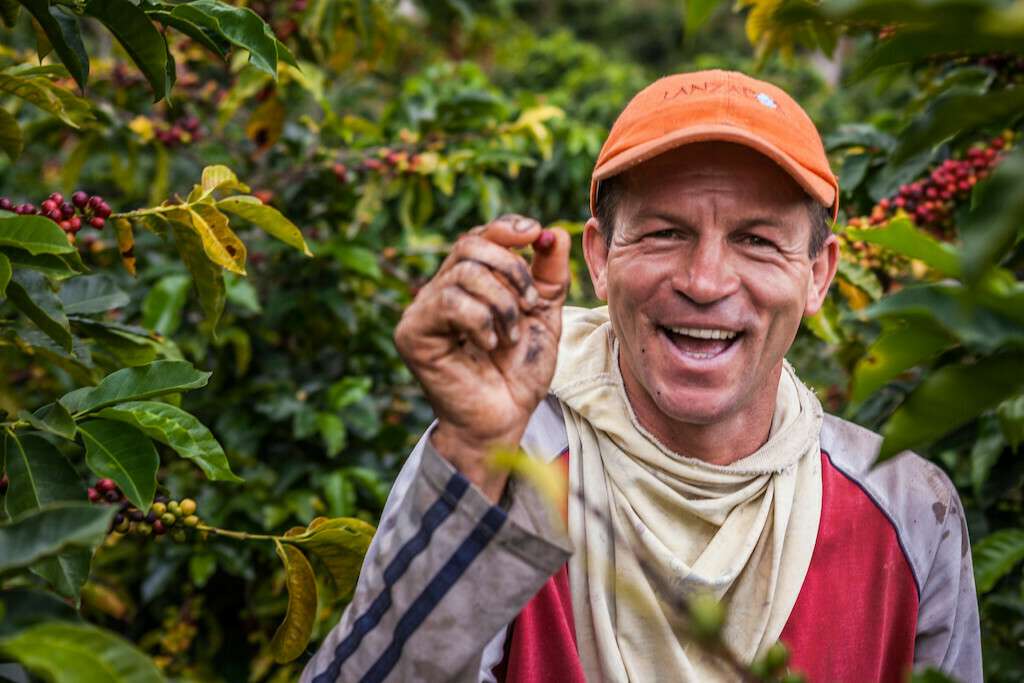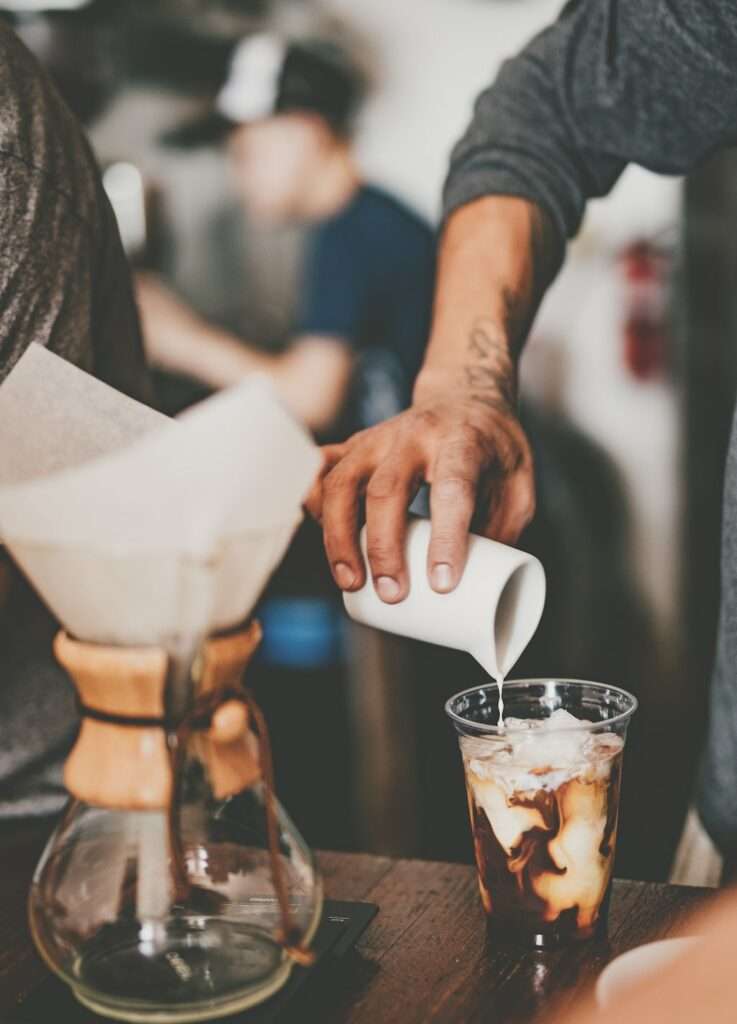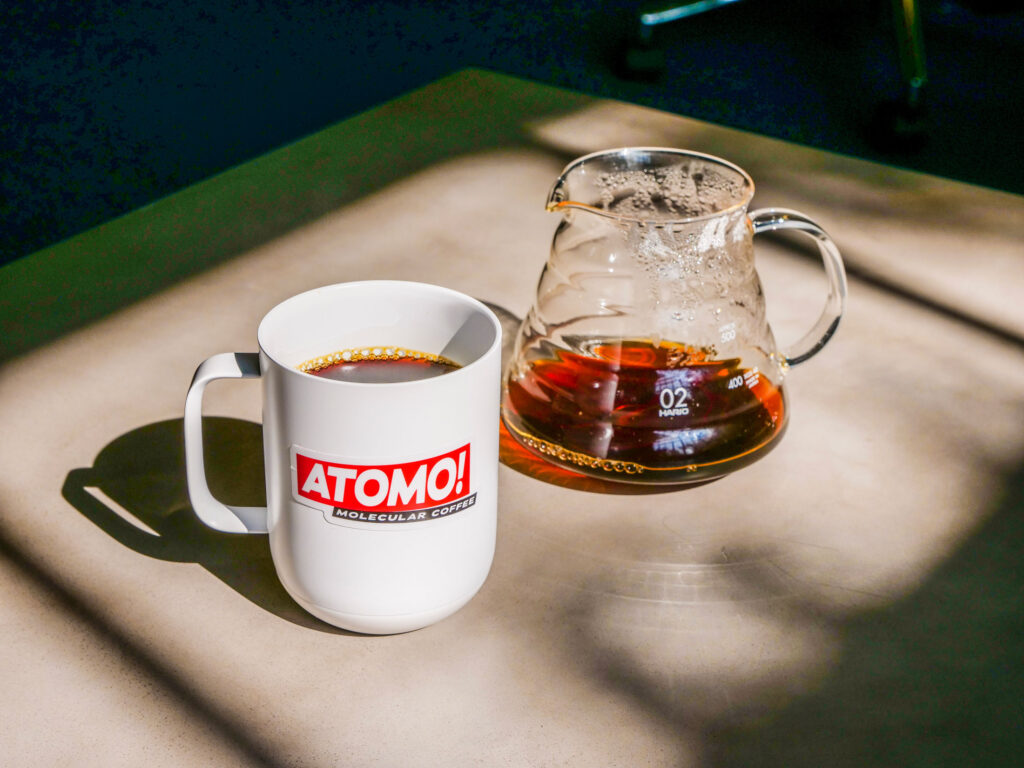As climate change impacts the coffee industry, one company, Atomo Coffee, says it has a solution: make coffee without the bean.
Coffee isn’t what it used to be. Over the last century, it has undergone significant transformations, both in how it is cultivated and how it is consumed. Historically, coffee farming was a sustainable practice — shade-grown, hand-harvested. But over the last century, giant coffee plantations took over and razed large swaths of forests, replaced traditional hand harvesting with machines, and focused on quantity over quality to the detriment of the farmers, forests, and regional biodiversity. Likewise, our coffee-drinking habits have also shifted; we’ve moved away from simple black, brewed drip coffee to lattes-as-art, high-tech espresso machines, and the perpetually divisive cold brew.
Third-wave coffee
As the impact of climate change takes a toll on the world’s coffee-producing regions, farmers are reverting to shade-grown coffee production methods to help protect the beloved bean and its ecosystems. It’s part of a movement called third-wave coffee, where small-batch is once again a priority. Similar to wine production, third-wave regards coffee as an artisanal foodstuff, focusing on the quality, provenance, and complex flavors of coffee beans. It emphasizes direct trade practices, sustainable farming, and specialized brewing methods to enhance the unique characteristics of each bean.

But coffee’s challenges are extensive, and while third-wave efforts are notable, they’re a drop in the bucket when compared to just how much of the stuff we drink — globally, that’s more than 2.25 billion cups of coffee per day. At the top of coffee’s problematic pyramid are the disposable single-use coffee pods ala Nespresso and Keurig machines. Even those are starting to see innovation, too.
Keurig recently announced K-Rounds, a new line of 100 percent compostable coffee pods designed to be used with the soon-to-be-released Keurig Alta machine. The K-Rounds are crafted from pressed coffee grounds encased in a compostable cellulose wrapper. Both the Keurig Alta and K-Rounds are scheduled for beta testing later this year, with a consumer launch anticipated in 2025. “We expect the K-Rounds to be 100 percent certified compostable before they come to market,” Keurig CEO Bob Gamgort said in a statement. Fellow pod maker Nespresso also debuted a more sustainable solution to the single-serve pod. Last year, it rolled out a paper pod in France and Switzerland, “for those who have access to and prefer to compost,” Julia Lauricella, head of the Nestlé System Technology Center said at the time.

But all of this may be a moot point as the coffee industry is one of the biggest industries at risk due to climate change, which could see the coffee bean struggle to survive on a warming planet. “Climate change is impacting both the quality and quantity of coffee yields due to rising temperatures, variable extreme weather events, and heightened pest activity,” Ed Hoehn, COO at Atomo Coffee, told Ethos via email.
This trend, Hoehn says, could lead to a potential 50 percent decline in the suitability of current coffee-growing regions by 2050, potentially affecting coffee supply and driving up prices. It’s why Atomo has turned to agricultural waste products, like date pits, as well as a range of superfoods, to create its beanless coffee. “We craft our espresso using a blend of farm-grown superfoods and upcycled ingredients, replicating the essential compounds found in coffee beans.” This innovative approach delivers a product that tastes just like coffee while reducing the environmental impact associated with conventional coffee production, such as carbon emissions and deforestation, Hoehn says.
Coffee without the coffee bean
Founded by Andy Kleitch, a serial entrepreneur, and Jarret Stopforth, a food scientist, Atomo set out to address the sustainability challenges within the coffee industry, with the goal of crafting a delicious coffee-like product that would also leave a positive impact on the environment. The company, which launched in 2019 and has raised more than $50 million to date, built the largest date seed upcycling facility in California’s Coachella Valley — about two hours east of Los Angeles. “We are rescuing about 4-6 million pounds of date seeds that were headed for landfill,” says Hoehn. “We clean, dry, and granulate them for use in our finished product which is produced at our Roastery in Seattle.”
Beginning next month, the beanless coffee will roll out to coffee shops across the U.S. It’s a strategic move aimed at fostering a consistent customer experience with Atomo’s espresso product, Hoehn says. “By collaborating with coffee shops, we not only introduce consumers to the Atomo brand but also leverage the expertise of professional baristas to showcase the unique benefits of our product.” As the company scales, it will build additional date pit upcycling facilities in proximity to date farms and processors around the world.

Atomo Coffee’s effort is not unlike what companies Beyond Meat and Impossible Foods have done in reverse-engineering the beef burger with plants. Ethan Brown, founder and CEO of Beyond Meat simplified the process to Fast Company in 2021, “[meat] really is amino acids, lipids, trace minerals, vitamins, and water,” he said. “All of those things are available in plants.” It’s the same for coffee, says Hoehn. Atomo Coffee has matched the molecular composition of coffee beans with its blend of superfoods and upcycled ingredients.
“This sustainable approach not only maintains the beloved taste and caffeine levels but also significantly reduces environmental impacts compared to conventional coffee farming,” Hoehn says. And like a plant-based burger offers health benefits over its conventional counterpart, Atomo says its coffee is lower in acidity than conventional coffee, high in antioxidants, and provides a gentler, cleaner caffeine experience with the caffeine coming from green tea.

Similarly, as Beyond and Impossible burgers are increasingly popular choices among flexitarians, Atomo sees itself not as a total replacement for coffee, but as a healthy, sustainable option for conscious consumers. “We are coffee at a molecular level,” Hoehn says. “Many other alt products try to emulate a taste profile. We have taken our approach to the extreme by designing our product at a molecular level. We have found all the same elements found in a coffee bean from other farm-grown natural ingredients.”
It also tastes great, Hoehn says. “Designed to deliver the flavor profile of traditional coffee, Atomo’s beanless coffee delivers a rich taste with notes of dark chocolate, dried fruit, and graham cracker,” he says. The response has, thus far, been extremely positive, and, Hoehn says, Atomo expects that to continue as the product hits coffee shops and expands from there. “Because we have placed our emphasis and focus on delivering a great-tasting product, we have no doubts about our ability to scale on the back of consumer demand.”
Related on Ethos:


